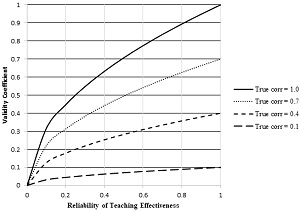Vol 2 No 1 (2021)
Research Article
Holding teachers accountable: An old-fashioned, dry, and boring perspective
Few would disagree with the desirability to hold teachers accountable, but student evaluations of teaching and department head evaluations of teaching fail to do the job validly. Although this may be due, in part, to difficulties conceptualizing teaching effectiveness and student learning, it also is due to insufficient attention to measurement reliability. Measurement reliability sets an upper bound on measurement validity, thereby guaranteeing that unreliable measures of teaching effectiveness are invalid too. In turn, for measures of teaching effectiveness to be reliable, the items in the measure must correlate well with each other, there must be many items, or both. Unfortunately, at most universities, those who are tasked with teaching assessment do not understand the basics of psychometrics, thereby rendering their assessments of teachers invalid. To ameliorate unsatisfactory assessment procedures, the present article addresses the relationship between reliability and validity, some requirements of reliable and valid measures, and the psychometric implications for current teaching assessment practices.

Pages 127-137
The Three Character Classic (《三字经》), also translated as San Zi Jing or The Triword Primer, is the traditional Chinese Primer with the most significant influence and the broadest appeal. In the 21st century Chinese traditional cultural revival, traditional texts such as the Three Character Classic are reused as child education primer. Is the Three Character Classic still suitable for contemporary children's literacy and enlightenment? From the perspective of cognitive psychology and child development psychology, this paper used a critical literature review method to investigate the relationship between the Three Character Classic and children's language development, attention, memory, cognition, and moral development. It found that the content, structure, teaching approach of it conform to children's physical and cognitive development during early childhood. The Three Character Classic is not only the primary text for children's Chinese learning but also a valuable tool to understand the spiritual core of traditional Chinese culture. It has a particular value for children's literacy and enlightenment and those who learn Chinese as a second language.
The transition from primary to secondary school is a critical period for children, which, for most children involves stress and anxiety (Jindal-Snape et al., 2020). If negotiated poorly, this transition can have a significant negative impact on children’s short- and long-term well-being and mental health (White, 2020). Despite this, efforts to improve children’s emotional experiences of primary-secondary school transition are minimal in research and face challenges in practice. Very few interventions focus on supporting children’s emotional well-being and these are limited in number, sustainability, and reach. Talking about School Transition (TaST) is a universal, emotional-centred teacher-led support intervention, which was developed to fill this gap in the literature. The evaluation of TaST consisted of a longitudinal questionnaire-based design investigating the efficacy of TaST in improving 143 Year 6 (aged 10 and 11 year old) children’s coping efficacy and adjustment. It was assessed using the outcome variables: Emotional Symptoms, Peer Problems, Coping Efficacy and Transition Worries, in addition to a qualitative process evaluation. Results suggest that TaST had immediate positive implications for participating children who showed a significantly greater reduction in Transition Worries once at secondary school, compared to control group children. TaST has implications for educational practice and policy in elucidating the importance of supporting children’s emotional well-being over this period and demonstrating the viability and success of implementing emotional-centred support intervention in practice.
Student learning styles: Implications for interprofessional education program design
This cross-sectional, exploratory, quantitative research project investigated differences in students’ learning styles across multiple academic disciplines. The Grasha-Reichmann Student Learning Style Scales (GRSLSS) was selected which presents six learning styles: independent, avoidant, collaborative, dependent, competitive, and participant. Surveys were administered to students (N = 448) registered in professional preparatory programs (n = 6) at a Midwest regional commuter-based campus. Results support the need for interprofessional education initiatives to be developed from a student-centered perspective where the attributes of learners are interwoven – explicitly and implicitly, into the learning experience.
Commentary
Managing students’ challenging behaviors is one of the most difficult tasks teachers face. Many teachers, during their training, were never required to take a class in behavior management. Consequently, it does not come naturally for teachers to manage students’ challenging behaviors and will be rarely be effectively addressed for two reasons: (1) certain teacher characteristics regarding behavior management and (2) some dimensions of school culture. The philosophical linchpin is not an inability of teachers to learn effective behavior management techniques, but rather what they believeabout the process. This article addresses teacher and school variables and offers alternative ideas about managing students’ behaviors more effectively.



 David Trafimow
David Trafimow



